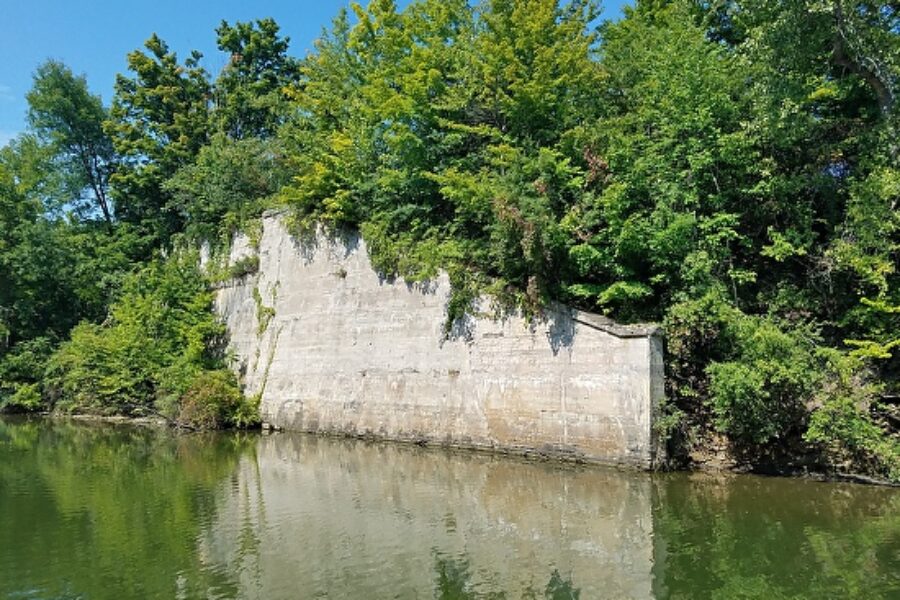Despite no air conditioning, with a cool breeze coming off the water and the welcome fan in our bedroom, I slept comfortably under a blanket and lightweight coverlet last night. It is Wednesday—the morning of the day that we head back upstream. It is impossible to believe.

We have coffee, shower, fill the tank with water, unplug and unhook. We approach the first lock and are told it will be a fifteen-minute wait. Another smaller, taller boat—a cabin cruiser—waits with us. Michael cuts the engines and shouts across the water for him to go into the lock first. After traversing eleven locks during the past three days, Michael hands me a boat-hook; a boat-hook! What an idea.
Traversing Some Challenging Locks
Watching the first mate of the vessel in front of us catch the line while the back of the boat careens and bobs, swinging away from the lock wall, makes me believe that the Harriett Wiles is easier to handle than I originally thought, or Michael is a better captain. Settled in, we traverse the two adjoining locks, rising 50 feet, with no problem.
With a boat hook in my hand, I feel powerful and proficient as we approach the third lock of the morning. Our boat companion of the earlier locks watches as I catch a line too soon. It stays put. Harriet continues her forward momentum. The hook I hold suddenly doubles in length; the line I hooked stretches, horizontal to the boat. I panic, wondering what to do—I can’t let go of the hook; it’s not ours. The line is impossible to unclasp from my hook—my arm is stretched as far as it will go. Pulling. Tugging, trying to hold on. Suddenly I am left holding nothing but a black rubber tube that wraps around the end of the aluminum shaft, which now floats in the lock beside us.
Damn Damn Damn! I know I am in trouble.
Our newly made friend—a winter Texan from Ohio—comes to my rescue with his own hook in hand, fishing my errant one out of the water and handing it to me. “I lost mine this morning too. The lockmaster had to help me out.” He smiles.
As we continue our journey, Michael lectures me about when and how to catch a line. “Don’t try to help me stop. Wait till I stop,” he says, “then grab the line.”
I think I’m learning. My gloves are dirtier than the firs day, anyway.

Challenges
We’ve been traversing the canal for six hours. The day is heating up. The sun feels brutal, yet it is only 89 degrees. Weather Bug says it feels like 95. How about 105? And I’m starving; the nutritious effects of a single Fiber One bar can last only so long. Our planned stop at Lyons can’t come soon enough.





Approaching Lyons town dock Michael instructs me to walk to the front of the bow and secure our barge to one of the cleats—normally, I just hand him the rope. Then, as he stands above me on the high concrete wall, he tells me to find the electric cord, hand it to him, plug my end into the boat and stop the engine. I’m not sure I can do all of this. The type of plugs and ignition used are not part of my bailiwick and I’m nervous about doing it all wrong. Where is my roaring woman when I need her, I wonder. I drop Michael’s camera and lose his glasses in the process.
And all I really wanted to do is have cheese and crackers and olives and a rum and coke, which I assemble as Michael talks to the owner of Mid-Lakes, letting him know the air-conditioner doesn’t work. A saint, he says he will drive over and take a look, but the system is new to him. Fixing it is a question mark. A big, big question mark. Peter Wiles is my hero. He came, he saw. He fixed. I am enclosed in an air-conditioned box, and I think it is wonderful.
A Gold Steel Ladder
Now I look at the concrete dock—that hits me at nose level—and wonder how in the world I am supposed to climb up to the top where there are stairs with rails that lead into the business district of this small town. Michael suggests I carefully walk along the barge railing till I reach the foldable step amidships and then lift myself up and over. I watch him—he struggles. If it isn’t easy for Michael, it will be impossible for me.


It looks like for me, there is only one way up—a gold steel ladder set into the concrete; an awkward climb, to say the least. I change clothes, knowing white pants would be ruined. I put on tennis shoes. The last round rung is even with the top of the wall; there is no handhold above. I gingerly climb up to the top of the barge’s bow. Holding on to the boat, I test out the ladder and begin. I never realized before this moment how important those high handlebars are that you hold on to when you are when getting out of a pool. There is really nothing to hold onto at the top of this ladder. My exit won’t be pretty, I know, but I flip and flop, claw, and roll—and manage.
We return with ice and wine and water. My descent is a bit better. But only a bit. None of it graceful.









Leave a Reply
Your email is safe with us.